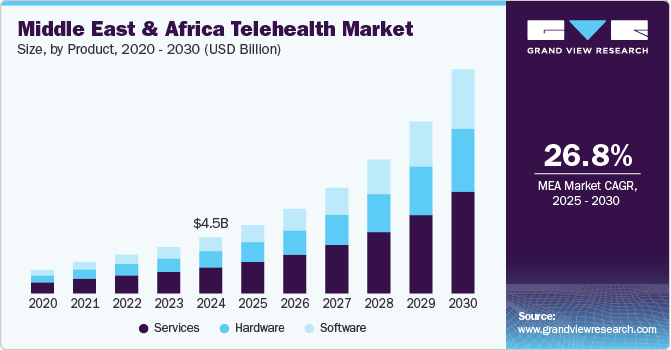Middle East And Africa Telehealth Market Strengthened by Public-Private Partnerships

The telehealth market in the Middle East and Africa was valued at USD 4.51 billion in 2024 and is projected to expand at a CAGR of 26.8% from 2025 to 2030. The growing digitalization of healthcare is being driven by improved internet connectivity and rising smartphone penetration. According to a 2023 GSMA report, the number of unique mobile subscribers in the Middle East and North Africa reached 415 million. Additionally, smartphone adoption in the region stood at 79% in 2022 and is anticipated to increase to 90% by 2030.
Countries such as Saudi Arabia, Qatar, the UAE, Kuwait, and South Africa are witnessing growth and advancements in their healthcare systems, paving the way for broader digital health adoption. These developments are being fueled by increasing digital readiness and greater investments in healthcare IT infrastructure. For instance, Saudi Arabia is actively implementing various strategies to advance healthcare digitalization, aiming to transform care delivery, enhance patient experiences, and improve overall efficiency. The country’s Vision 2030 initiative is a key government-led effort to drive transformation across the healthcare sector.
With the growing prevalence of smartphones, governments, entrepreneurs, and healthcare professionals are increasingly leveraging mobile technologies to promote healthier lifestyles. Key areas contributing to the digital health landscape in the Middle East and Africa include the provision of self-service solutions, the adoption of virtual healthcare options where feasible, workflow automation, paperless operations, and the implementation of decision intelligence systems.
Product Insights
In 2024, the services segment led the market, accounting for the largest revenue share at 46.4%. This leadership is attributed to rapid advancements in hardware and software, along with a rise in software upgrades. The significant presence of service providers further supports segment growth. Digital health service providers enhance care delivery by offering more accurate diagnoses, real-time monitoring of chronic conditions, effective treatment planning, improved care coordination, and better communication between patients and providers. Additionally, due to limited resources and expertise within healthcare facilities for deploying digital health solutions, many organizations outsource these services—either entirely or partially through long-term contracts. Services such as installation, training, and upgrades rely heavily on the development and deployment of these platforms.
Delivery Mode Insights
The web-based segment dominated the market in 2024, capturing the largest revenue share of 45.0%. This dominance is driven by the widespread availability of web-based telehealth platforms in the region. High adoption rates among both healthcare providers and patients contribute to the segment’s growth. Web-based platforms simplify operations by handling large data volumes efficiently. Their cost-effectiveness and user-friendly interfaces are further propelling the segment’s expansion.
Get a preview of the latest developments in the Middle East And Africa Telehealth Market! Download your FREE sample PDF today and explore key data and trends
End Use Insights
The providers segment led the market in 2024, accounting for the largest revenue share of 52.6%. Healthcare providers are increasingly adopting telehealth platforms to alleviate pressure on hospital infrastructure and personnel. Growing demand for quality healthcare from a rapidly expanding population also fuels adoption. Healthcare facilities are seeing improvements in workflow management and clinical outcomes through streamlined access to patient health records, real-time monitoring and reporting, and enhanced data-driven decision-making. Virtual care solutions are boosting providers’ efficiency and effectiveness, enabling a shift towards value-based care models.
Key Middle East and Africa Telehealth Market Players
Market leaders are focusing on innovative strategies such as expanding product portfolios, forming partnerships and collaborations, pursuing mergers and acquisitions, and broadening their market presence.
Prominent companies in the Middle East and Africa telehealth market include:
- Teladoc Health
- McKesson Corporation
- Altibbi
- Koninklijke Philips N.V.
- Siemens Healthineers
- Medtronic
- Cura
- Cerner Corporation
- Cisco Systems, Inc.
Gather more insights about the market drivers, restrains and growth of the Middle East And Africa Telehealth Market
- Art
- Causes
- Crafts
- Dance
- Drinks
- Film
- Fitness
- Food
- Oyunlar
- Gardening
- Health
- Home
- Literature
- Music
- Networking
- Other
- Party
- Religion
- Shopping
- Sports
- Theater
- Wellness
- IT, Cloud, Software and Technology


